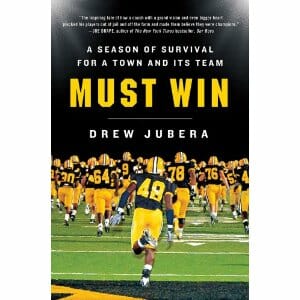Must Win: A Season of Survival for a Town and its Team by Drew Jubera
Must Read

Full disclosure: Drew Jubera, author of Must Win, is a friend.
Fuller disclosure: Drew Jubera has written the best nonfiction book I have read since the year 2000.
I know. Go ahead, Paste reader. Sniff. Scoff. Roll your eyes. Mumble something nasty about friends reviewing friends, the back-scratching among the boys on the book bus.
But then do this. Open Must Win and read:
The black kid with the badass tats stood smiling on the practice field sideline. Beat jail. Helmet off, earring on fire in the afternoon sun, he surprised teammates with his out-of-nowhere appearance, as if he’d spontaneously erupted from the heat and the sweat, returned now to this gnat-bitten patch of deepest South Georgia from a biblical sounding exile of forty-four days and forty-four nights – wandering the wilderness, right across town, inside the Lowndes County lockup.
Odell James took a very deep breath; the still, cooked air never tasted sweeter. Timber trucks rumbled down a nearby four-lane: music. The ink stamped up and down his dark biceps – the numerals 229 and 912, area codes for Valdosta and nearby Homerville, the two addresses the eighteen-year-old had called home – glistened beneath a relentless blue sky.
It was September, but still it was hot. Make-you-stupid hot. A halo of gnats, the state bird of South Georgia, swarmed Odell’s head like wild electrons. A handful of teammates banished to the sideline beside him – recidivist goof-offs, including some of the white boys; a few other hard cases trying to make comebacks – quickly formed a semicircle around him, angling to bask in the glow of his by-God sure-enough street cred.
They wanted stories, jailhouse stories. Stories to kill time, stories to retell later. Anything to make bearable this open-air asylum patrolled by a new coach hell-bent on making this strip back into the most fearsome green acre on any high school campus in America.
Jubera got his deft writing chops toiling for years at big-deal newspapers, lastly the Atlanta Journal-Constitution, where he covered the South from the national desk. He left the AJC a few years ago, and his byline began to appear more widely. The New York Times. Esquire. Places like that.
What most beguiled Jubera on his reporting trips around the football-crazy South? Well … football. Most especially a gridiron saga of the legendary Valdosta High School Wildcats. the winningest high school team in America.
With 50,000 people in 2010, Valdosta always found gifted athletes in the surrounding cotton fields and piney woods and put them in pads in Death Valley, its 11,000-seat stadium. There, for 30-plus years, the Wildcats put a whuppin’ on most every other team they played. National media dubbed Valdosta “Title Town USA.” Life in Valdosta, every day of the year, meant a life among Wildcats.
-

-

-

-

-

-

-

-

-

-

-

-

-

-

-

-

-

-

-

-

-

-

-

-

-

-

-

-

-

-

-

-

-

-

-

-

-

-

-

-








































